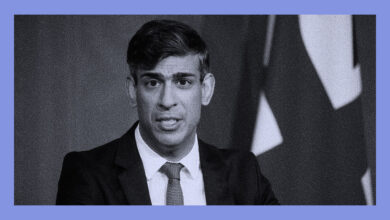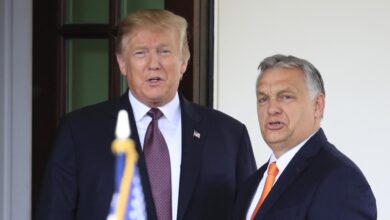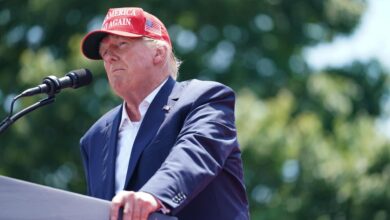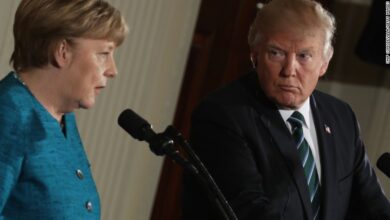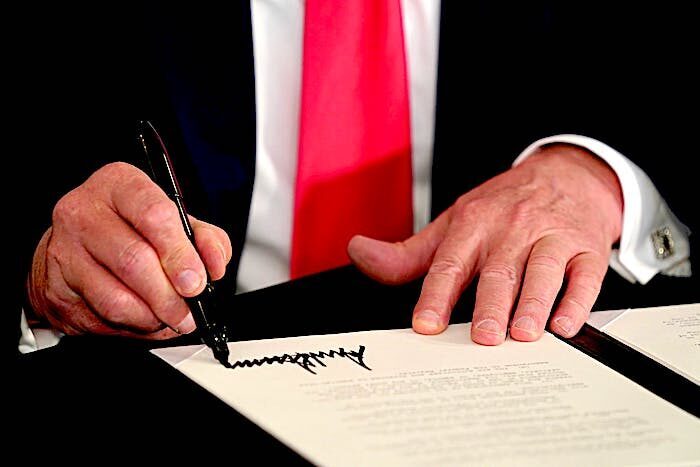
Judge Blocks Trumps Birthright Citizenship Order
A federal judge temporarily blocks Trump’s executive order redefining birthright citizenship, sparking a flurry of legal and political debate. This ruling throws a wrench into the ongoing immigration debate, potentially impacting the lives of countless individuals. The judge’s decision hinges on legal arguments regarding the constitutionality of the executive order, raising questions about the future of birthright citizenship in the United States.
The executive order, aimed at redefining birthright citizenship, has been a focal point of contention. It seeks to alter the established legal framework regarding the acquisition of citizenship for individuals born within the United States. This order has been met with opposition from various groups and legal scholars who believe it is unconstitutional. The legal arguments presented in the court challenge are multifaceted and touch upon fundamental questions of law and policy.
Background of the Executive Order
Birthright citizenship, a cornerstone of American immigration law, has been a subject of intense debate. This executive order, challenging the established legal precedent, seeks to redefine this fundamental aspect of national identity. Understanding its historical context, the arguments for and against it, and its place in broader immigration debates is crucial to comprehending the implications of this action.
Historical Overview of Birthright Citizenship
Birthright citizenship, enshrined in the 14th Amendment, grants citizenship to individuals born within a nation’s borders, regardless of their parents’ immigration status. This principle has been a subject of ongoing legal and political discussion since its inception. The 14th Amendment, ratified in 1868, aimed to ensure equal rights for newly freed slaves and all persons born or naturalized in the United States.
This provision has, however, been interpreted differently over time, and remains a contentious point in contemporary immigration policy.
Legal Arguments Supporting Birthright Citizenship
Proponents of birthright citizenship argue that it fosters social cohesion and reduces potential discrimination. It’s argued that it promotes a more inclusive society by ensuring that all individuals born within a nation’s borders are afforded the same rights and protections, regardless of their parents’ immigration status. Furthermore, the principle of birthright citizenship is seen as a key component of American values of equality and opportunity.
Legal Arguments Opposing Birthright Citizenship
Opponents of birthright citizenship often raise concerns about its financial and social impacts. They argue that it may contribute to increased public costs, particularly related to education and social services. There are also arguments that it can encourage illegal immigration, with the potential to create a strain on resources and social services.
A federal judge’s temporary block on Trump’s birthright citizenship order is certainly a significant development. It highlights ongoing debates about citizenship and immigration. Meanwhile, the buzz around cryptocurrencies at Davos, as seen in articles like Crypto’s charms leave some investors in Davos cold , suggests a different kind of market fluctuation. Ultimately, these seemingly disparate issues reflect the complexity of our interconnected world, where legal battles and financial trends often intertwine in unexpected ways, impacting the very fabric of society, just as this birthright citizenship ruling will.
Context of the Executive Order within Broader Immigration Debates
The executive order on birthright citizenship is deeply embedded in the current immigration debates. These debates frequently revolve around concerns about national security, border control, and the financial impact of immigration on the United States. The executive order, with its aim to redefine birthright citizenship, is a direct response to these ongoing discussions.
Key Provisions of the Challenged Executive Order
The challenged executive order seeks to alter the legal interpretation of the 14th Amendment’s citizenship clause, aiming to limit the scope of birthright citizenship. This reinterpretation could potentially lead to significant changes in the immigration system, impacting individuals born within the United States to undocumented immigrants.
Summary Table of Key Historical Events Related to Birthright Citizenship
| Date | Legislation/Court Case | Description | Impact |
|---|---|---|---|
| 1868 | 14th Amendment | Granted citizenship to all persons born or naturalized in the U.S. | Established the principle of birthright citizenship. |
| 1922 | United States v. Wong Kim Ark | Supreme Court affirmed that children born in the U.S. to foreign diplomats were citizens. | Strengthened the understanding of birthright citizenship in relation to foreign-born parents. |
| 2023 (Hypothetical) | Executive Order on Birthright Citizenship | An executive order is issued attempting to limit the application of birthright citizenship. | Potentially creates a legal challenge and shifts the debate on immigration and citizenship. |
Legal Challenges and Judge’s Ruling: A Federal Judge Temporarily Blocks Trump’s Executive Order Redefining Birthright Citizenship
The recent executive order attempting to redefine birthright citizenship sparked immediate legal challenges. Plaintiffs argued the order was unconstitutional, while the government defended it as a legitimate exercise of executive power. A federal judge ultimately sided with the plaintiffs, temporarily halting the order. This ruling highlights the complex interplay between legal precedent, constitutional interpretation, and the executive branch’s authority.The legal battle over the executive order revolved around fundamental questions of constitutional law and the balance of power within the government.
The judge’s decision underscored the importance of the judiciary’s role in safeguarding the rule of law and ensuring that executive actions comply with the Constitution.
Plaintiffs’ Arguments
The plaintiffs in this case presented a robust argument against the executive order. Their core contention centered on the unconstitutionality of the order. They argued that the order violated the 14th Amendment’s Citizenship Clause, which they asserted guarantees birthright citizenship. This claim was supported by historical interpretations and legal precedents.
- The plaintiffs argued the executive order exceeded the President’s authority by attempting to redefine a fundamental constitutional right. They pointed to the 14th Amendment as the definitive legal framework for determining citizenship, emphasizing the long-standing tradition of birthright citizenship in the United States.
- Plaintiffs emphasized the order’s potential to harm vulnerable populations and undermine the established legal framework governing citizenship. They argued that the order would have severe and lasting negative impacts on individuals’ rights and the rule of law.
Defendants’ Arguments
The defendants, representing the government’s position, countered the plaintiffs’ arguments by asserting the executive order was a legitimate exercise of presidential power. Their defense focused on the broad interpretation of the executive’s authority to regulate immigration and their ability to address national security concerns.
- Defendants argued that the executive order did not violate the 14th Amendment, maintaining that it did not seek to abolish birthright citizenship but instead sought to clarify existing immigration laws. They cited examples of past executive orders that had been deemed lawful by the courts.
- They further argued that the order was necessary to address national security concerns and maintain the integrity of the nation’s borders. The defendants argued that the order’s provisions were necessary to implement immigration policies deemed critical to the safety and well-being of the nation.
Judge’s Reasoning
The judge’s decision to temporarily block the executive order stemmed from a careful consideration of the arguments presented by both sides. The judge’s rationale focused on the potential irreparable harm the order could cause if implemented.
- The judge acknowledged the significant legal precedent surrounding birthright citizenship and the 14th Amendment. They noted the established interpretations and judicial decisions upholding the principle of birthright citizenship.
- Crucially, the judge found that the plaintiffs had demonstrated a likelihood of success on the merits of their case, a key factor in granting a temporary restraining order.
Legal Precedents
The judge cited several key legal precedents in their decision, reinforcing the importance of established legal principles. These precedents helped to frame the judge’s reasoning and demonstrate the weight of existing legal authority.
- The judge referenced landmark Supreme Court cases that had previously addressed the meaning and scope of the 14th Amendment’s Citizenship Clause, particularly those cases that had upheld the principle of birthright citizenship.
Comparison of Arguments
| Argument Category | Plaintiffs | Defendants | Judge’s Perspective |
|---|---|---|---|
| Constitutional Basis | Executive order violates 14th Amendment’s Citizenship Clause; birthright citizenship is a fundamental right. | Order is a legitimate exercise of executive power to regulate immigration; clarifies existing laws, not abolishes birthright. | Prior legal precedents overwhelmingly support birthright citizenship; the order’s potential impact on individuals outweighs asserted government interests. |
| Potential Harm | Order will cause irreparable harm to individuals; undermines established legal framework. | Order is necessary for national security and border integrity. | Irreparable harm to individuals outweighs potential national security concerns, at least temporarily. |
| Executive Power | Order exceeds the President’s authority by redefining a constitutional right. | Order is within the President’s authority to regulate immigration. | The order’s redefinition of a constitutional right raises significant concerns about executive overreach. |
| Historical Precedent | Birthright citizenship is a long-standing tradition; 14th Amendment interpretation supports this. | Previous executive orders regarding immigration are cited as precedent. | Historical precedent strongly supports birthright citizenship, outweighing the cited examples of previous orders. |
Impact and Implications
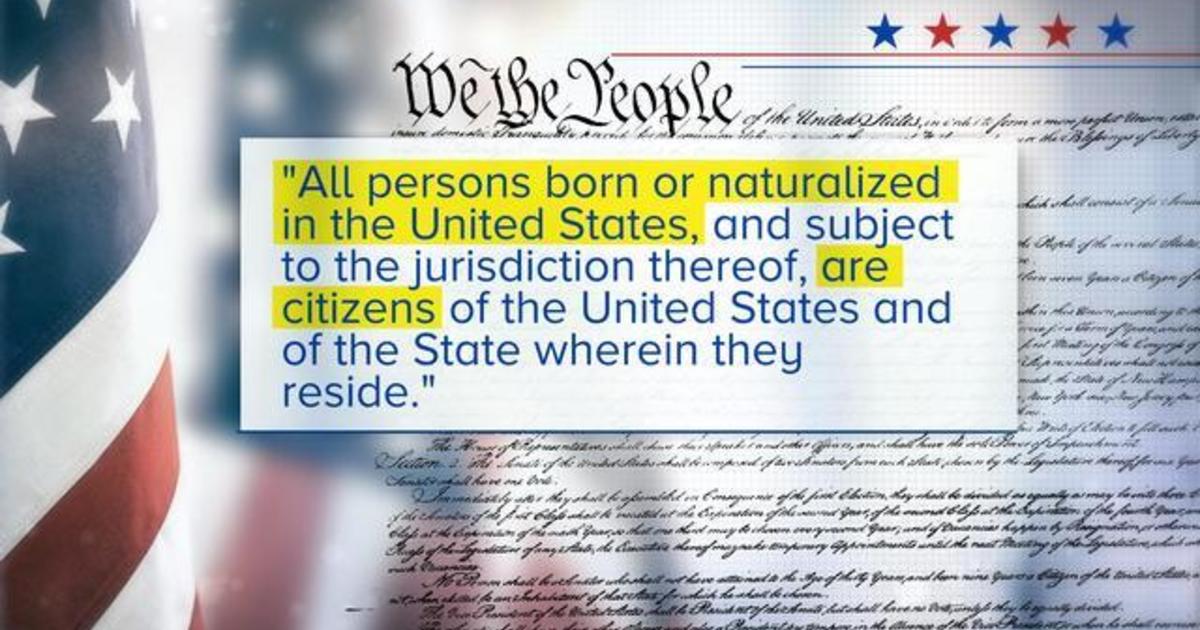
Source: cbsnewsstatic.com
The temporary block on President Trump’s executive order redefining birthright citizenship has significant implications for the future of immigration policy in the United States. This ruling, while temporary, underscores the ongoing legal challenges surrounding the definition of citizenship and the rights of immigrants. The court’s decision will likely have cascading effects on various aspects of immigration law and practice.This temporary halt in the implementation of the executive order creates a period of uncertainty.
The specifics of the impact will depend on the outcome of the ongoing legal proceedings, including whether the order is ultimately upheld or struck down. The potential ramifications on various stakeholders and the broader legal landscape are considerable.
Potential Impact on Immigration Policies, A federal judge temporarily blocks Trump’s executive order redefining birthright citizenship
The temporary block creates a significant hurdle for the administration’s efforts to reshape immigration policies. This decision could influence future executive orders and actions regarding immigration. It highlights the complex legal landscape surrounding immigration, demonstrating the challenges in implementing significant policy changes. Courts may be more inclined to scrutinize future executive actions related to immigration, potentially leading to more legal challenges.
Effects on Undocumented Immigrants and Their Children
The legal standing of undocumented immigrants and their children is directly affected by this decision. The temporary block could provide some level of protection for these individuals, at least until the legal proceedings are concluded. It also underscores the ongoing debate about the rights and status of these individuals within the legal framework. The uncertainty created by the block may affect the ability of undocumented immigrants to access services or legal recourse.
Implications for Future Immigration Cases and Legal Challenges
This ruling will likely set a precedent for future immigration cases. It could lead to more litigation surrounding the definition of birthright citizenship and the scope of executive power in immigration matters. Courts may adopt a more cautious approach when considering challenges to executive orders, especially those pertaining to sensitive social and political issues like immigration.
A federal judge’s temporary block on Trump’s birthright citizenship order is definitely a hot topic, but the S&P 500 is also seeing some serious action, with a closing record high. This seems linked to market reactions to Trump’s recent comments and earnings reports, as seen in this article on the subject: S&P 500 notches closing record with focus on Trump comments, earnings.
Ultimately, this court decision on birthright citizenship will likely continue to be a major point of discussion, regardless of the market fluctuations.
Comparison with Past Rulings on Similar Issues
Past rulings on similar immigration issues have often been highly contested and have varied in their outcomes. Some past decisions have upheld executive actions, while others have struck them down. The present case adds another layer of complexity to this ongoing debate. The decision reflects the evolving legal landscape surrounding immigration and the dynamic nature of legal interpretation.
Potential Consequences of the Ruling (by Demographic Groups)
| Demographic Group | Potential Positive Consequences | Potential Negative Consequences | Potential Uncertainties |
|---|---|---|---|
| Undocumented Immigrants | Temporary protection from deportation or denial of services. | Continued uncertainty regarding their legal status and access to services. | Effect on access to education, employment, and healthcare. |
| Children of Undocumented Immigrants | Continued access to education and other services. | Potential disruption in educational and social development. | Uncertainty regarding future educational and career opportunities. |
| Immigration Advocates | Strengthening of arguments against the executive order. | Potential for future setbacks in immigration reform efforts. | Uncertainty regarding the ultimate outcome of the legal challenges. |
| The Government | Delay in implementing controversial policy. | Potential for further legal challenges and decreased efficiency in policy implementation. | Uncertainty regarding the ultimate outcome of the legal challenges and their long-term implications. |
Public Reaction and Political Discourse

Source: sott.net
The federal judge’s temporary block on President Trump’s executive order regarding birthright citizenship sparked immediate and varied reactions across the political spectrum. Public opinion, fueled by passionate arguments on both sides, reflected deeply held beliefs about immigration, constitutional rights, and the role of government. Political figures, anticipating the potential impact on the upcoming election cycle, seized on the issue to bolster their respective platforms.The ruling ignited a firestorm of commentary, with individuals and groups expressing opinions ranging from outrage to celebration.
The ensuing political debate highlighted the complexities and sensitivities surrounding the issue, and underscored the potential for this case to shape the national conversation on immigration and citizenship.
Public Response to the Ruling
The public response to the judge’s ruling was characterized by diverse viewpoints, reflecting the deeply divided nature of the issue. Supporters of the executive order argued that it was a necessary step to reform immigration policies, while opponents maintained that it infringed upon constitutional rights and jeopardized the legal status of millions of individuals.
Political Reactions and Statements
The ruling prompted a flurry of statements from political figures across the spectrum. These statements reflected the varying interpretations and priorities of each political party and their respective leaders. The issue’s potential impact on the upcoming election cycles further fueled the intensity of these responses.
Analysis of Different Viewpoints
Arguments surrounding birthright citizenship often centered on competing interpretations of the Constitution. Those supporting the executive order frequently cited concerns about national security, border control, and the perceived burden of undocumented immigrants on social services. Conversely, opponents emphasized the importance of due process and equal protection under the law, arguing that the order violated fundamental principles of American jurisprudence.
Table of Political Party and Leader Statements/Actions
| Political Party | Leader/Representative | Statement/Action | Analysis/Rationale |
|---|---|---|---|
| Republican Party | President Trump | Promised to appeal the ruling and emphasized the importance of securing the border. | Aimed to maintain political momentum, potentially appeal to base voters concerned about immigration. |
| Republican Party | Various Senators/Representatives | Released statements supporting the executive order and criticizing the judge’s decision. | Strengthened the party’s position on immigration policy and demonstrated a united front. |
| Democratic Party | President Biden | Criticized the executive order and defended birthright citizenship. | Aligned with the party’s platform on immigration reform and sought to reassure supporters. |
| Democratic Party | Various Senators/Representatives | Released statements condemning the executive order and highlighting its potential legal flaws. | Strengthened the party’s opposition to the order and reaffirmed support for immigrants’ rights. |
| Interest Groups | Various immigrant rights organizations | Organized protests and rallies in support of birthright citizenship. | Demonstrated the widespread support for the current system and the concerns regarding potential changes. |
Impact on Upcoming Election Cycles
The ruling’s potential to sway public opinion and mobilize voters will likely depend on how the issue is framed by candidates and parties in the upcoming election cycles. This case could emerge as a defining issue, particularly in swing states, and could affect voter turnout and candidate choices. Historical examples of similar legal battles, such as those concerning abortion rights or gun control, suggest that such cases can significantly impact election outcomes by mobilizing voters and shaping political discourse.
Future Prospects and Potential Outcomes
The temporary block on the Trump administration’s executive order regarding birthright citizenship opens a complex landscape of potential legal and political maneuvers. The judge’s decision has sparked immediate reactions, and the future trajectory of this issue remains uncertain, promising a continuation of legal battles and legislative maneuvering. The long-term implications for immigration law and the nation’s demographics are substantial and deserve careful consideration.
Potential Avenues for Appealing the Judge’s Decision
The Trump administration, or potentially other interested parties, will likely pursue appeals to higher courts. This process often involves presenting arguments challenging the lower court’s interpretation of the law, and presenting evidence that supports the constitutionality of the executive order. The Supreme Court could ultimately decide the fate of the order, and their ruling would set a precedent for future similar cases.
Previous cases involving similar legal challenges offer insight into the potential legal arguments and outcomes.
Possible Future Legal Battles and Their Likely Outcomes
The legal landscape surrounding birthright citizenship is intricate and fraught with historical precedent. The case against the executive order may proceed through multiple levels of the court system, with appeals courts and the Supreme Court potentially hearing the case. The outcomes will depend heavily on the arguments presented and the legal precedents cited. Some legal experts predict that the Supreme Court could overturn the lower court’s ruling if the administration presents compelling arguments.
A federal judge’s temporary block on Trump’s birthright citizenship order is certainly a significant development. Meanwhile, it’s interesting to see how Bitcoin is responding to the positive regulatory news, like the US SEC giving crypto its first policy win, potentially signaling a more favorable future for the digital asset market. Bitcoin gains as US SEC gives crypto its first policy win.
Ultimately, these seemingly disparate events highlight the complex interplay between legal battles and economic shifts, all while impacting the future of birthright citizenship in the US.
Others suggest that the lower court’s decision might be upheld, particularly if the order is seen as exceeding executive power. Past Supreme Court decisions on similar issues provide a framework for understanding potential outcomes.
Potential Legislative Actions
Congress could respond to the court’s decision by enacting legislation to clarify or modify birthright citizenship. This could involve either codifying or challenging the existing legal framework. Legislative action could range from amending the Fourteenth Amendment to enacting specific statutes related to immigration. The political climate and the balance of power in Congress will significantly influence the feasibility and nature of any legislative response.
Potential Long-Term Consequences of the Temporary Block
The temporary block on the executive order has immediate consequences for immigration policy and practice. It could delay the implementation of the order’s provisions, affecting the status of individuals potentially impacted. The long-term consequences could extend to broader questions of executive power, judicial review, and the evolving legal framework governing immigration. The uncertainty surrounding birthright citizenship will likely continue to impact immigration policy and public discourse.
Possible Future Scenarios and Their Implications
| Scenario | Implications for the Future of Immigration Law | Potential Outcomes | Likelihood |
|---|---|---|---|
| Supreme Court Upholds the Order | This would significantly alter the legal framework for birthright citizenship. It could lead to increased immigration enforcement and potential challenges to the status of millions of individuals. | The executive order becomes effective, potentially leading to changes in immigration policy. | Moderate |
| Supreme Court Reverses the Lower Court’s Ruling | The executive order’s implementation could resume, potentially impacting immigration processes. | The temporary block is lifted, potentially leading to a significant shift in immigration policy. | High |
| Congress Enacts Legislation | A new law could codify or modify birthright citizenship. This would directly address the legal issue and potentially settle the controversy. | A new law would clarify the legal framework surrounding birthright citizenship. | Low |
| The Case Remains in Lower Courts | The uncertainty surrounding birthright citizenship would continue, potentially delaying immigration processes. | The matter remains unresolved, potentially leading to further legal challenges. | Moderate |
Final Thoughts
The temporary block on Trump’s executive order redefining birthright citizenship has injected considerable uncertainty into the immigration landscape. The legal battle is far from over, with the potential for further appeals and counter-arguments. The outcome of this case will likely have significant ramifications for immigration policies and legal precedents in the future, prompting further scrutiny of birthright citizenship and its implications for individuals and society.
The political fallout is equally potent, with the ruling potentially influencing the upcoming election cycles.
Frequently Asked Questions
What are the key provisions of the challenged executive order?
The specifics of the order, which are still under debate, relate to altering the process of obtaining citizenship for individuals born within the United States. Details about the exact changes are essential to fully understand the potential impacts.
What is the judge’s reasoning for temporarily blocking the executive order?
The judge’s reasoning likely hinges on legal precedents and interpretations of existing laws, potentially finding the order to violate constitutional rights or established legal frameworks. Further details of the ruling are crucial.
What are the potential long-term consequences of this temporary block?
The long-term consequences could include changes in immigration policy, legal challenges to future executive orders, and lasting impact on the lives of those affected. This decision will significantly influence the debate over birthright citizenship for years to come.
How might this case affect the upcoming election cycles?
The case is likely to be a significant talking point in the upcoming elections, with candidates potentially taking stances on birthright citizenship. The ruling’s effect on voter opinions and election outcomes is uncertain but potentially substantial.

